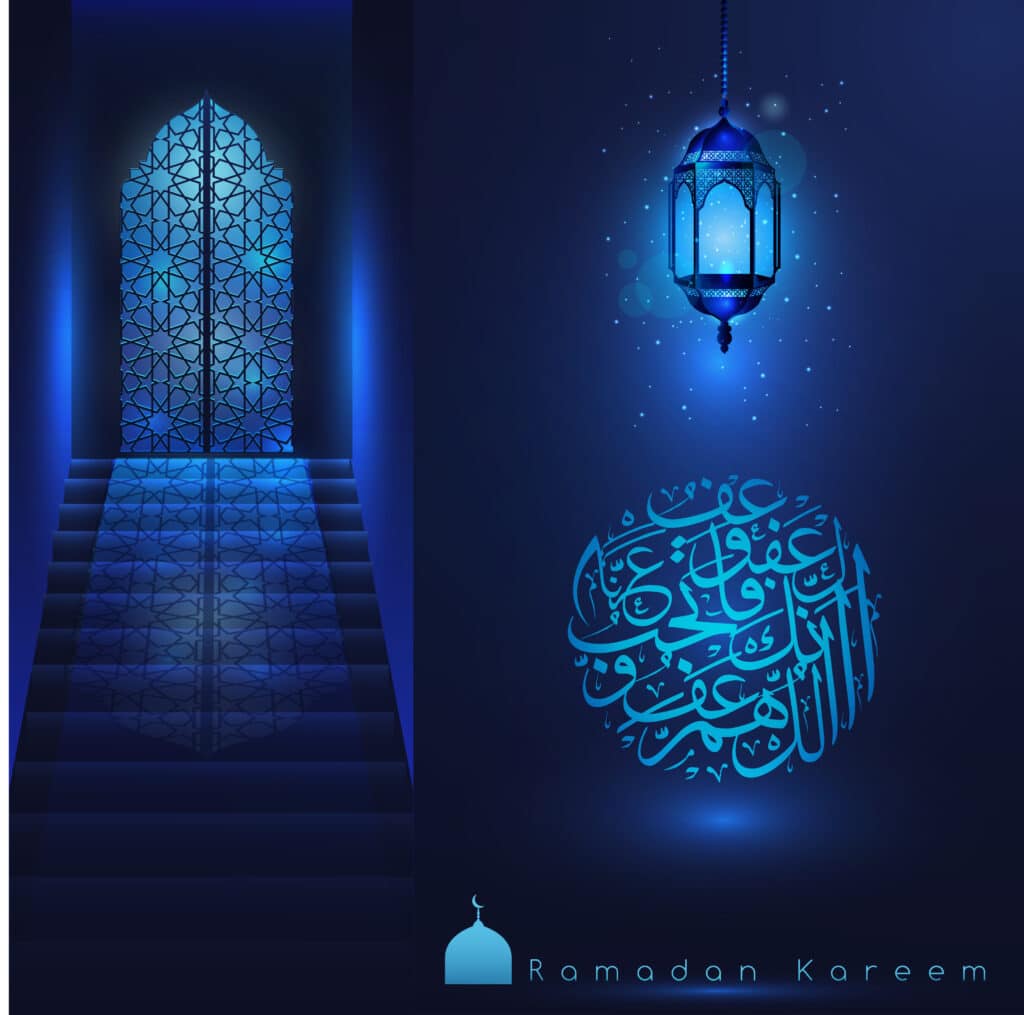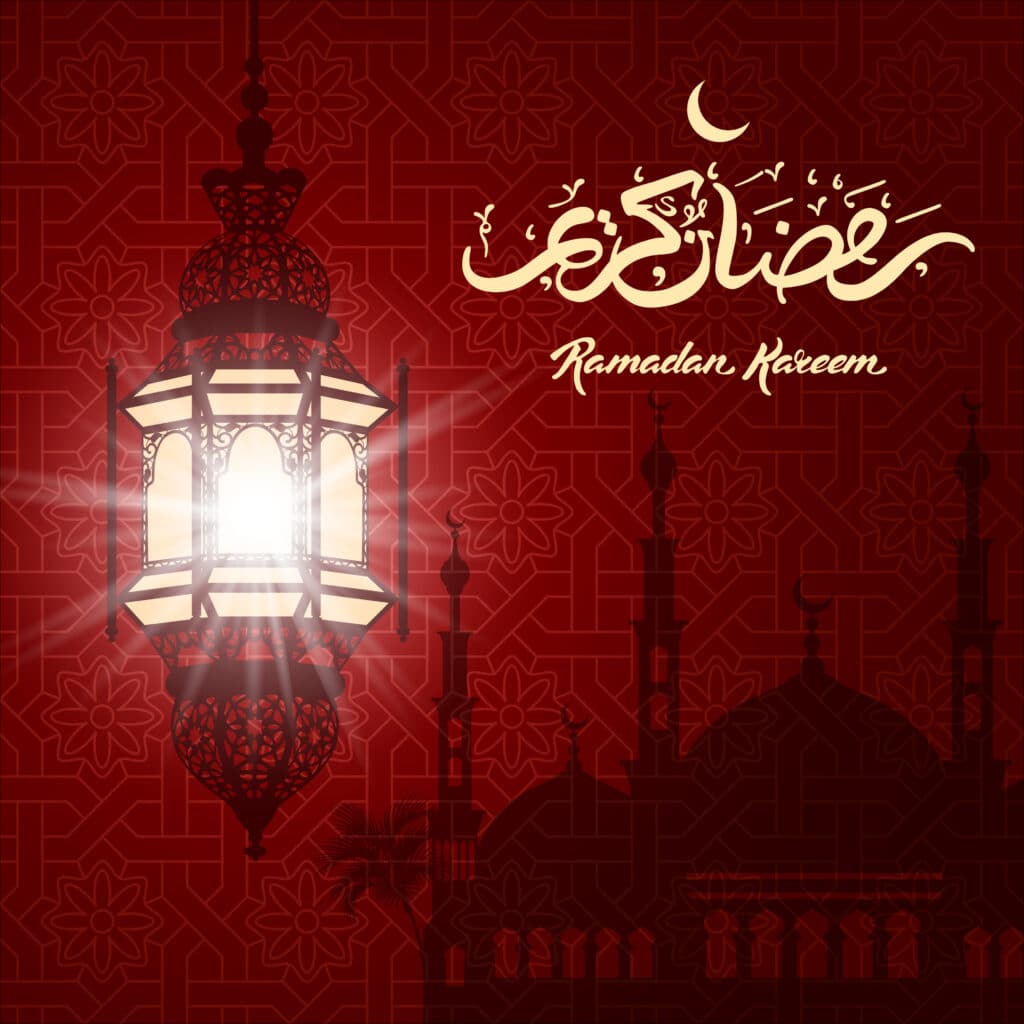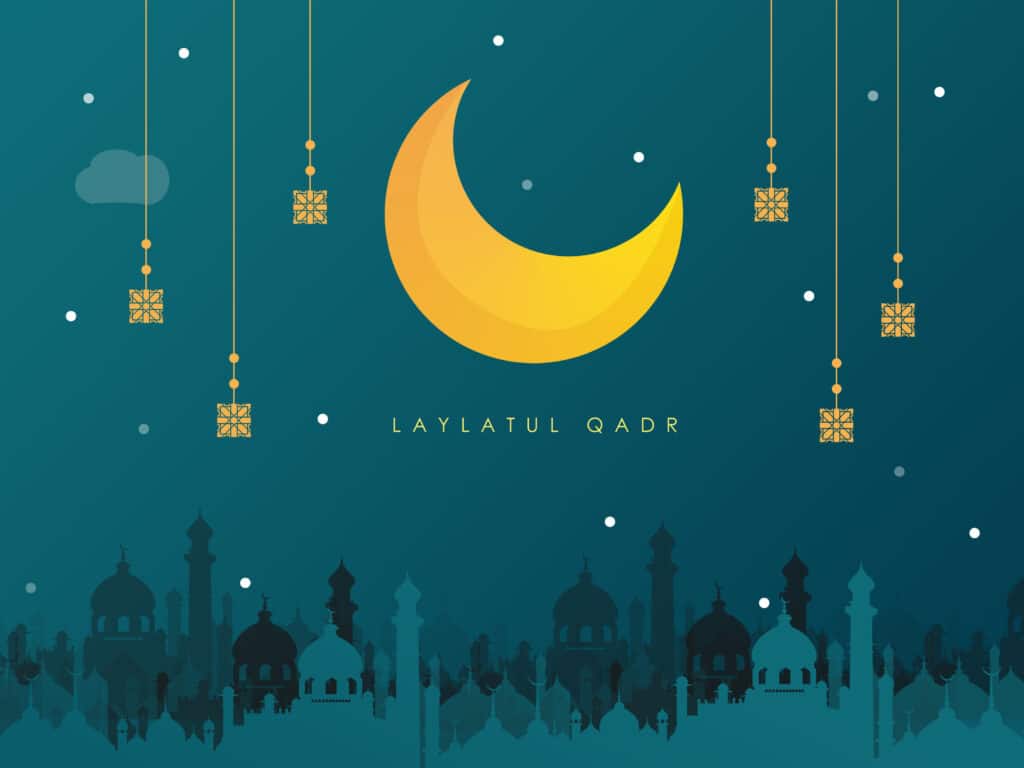
The Month of Fasting, Repentance, and Charity
Ramadan is the ninth month of the Islamic calendar. It is the most important month of the year, the month of the universal community of believers, the month of the soul. The arrival of this blessed month is greeted with joy, for in it the doors of heaven are opened further for the faithful and the Divine Compassion descends upon those who seek it. Each individual is responsible for sighting the new moon and knowing when the month begins. Read SSC’s moon sighting policy here.
During Ramadan we deepen our tawba, the moment-by-moment repentance and renewal of life in the Real, the Most Ancient, seeking His mercy, forgiveness and protection. This is the month for reestablishing our commitment and cleaning our relationship with our Creator. For those on the Path, the knowers, it is a special time to be with Allah, to be with Him in everything -to be in the station of la ilaha illa-llah.
This month is set aside by Allah most High for the believers to fast from dawn to dusk. Because one abstains from eating, drinking, and intimate relations during the day, more time is spent in special worship. Each evening during Ramadan, the daily fast is broken with a festive meal and much celebration and praise to the glory of God. The evening meals are followed by the special Tarawih prayers. Far from a difficult obligation or a penance, the fasting month is a special time when the Muslims of the planet draw together and drink from the special light of Allah, blessed is He.
The most sacred night of Ramadan and of the year is Laylat al-Qadr, the Night of Power, which marks the descent of the Qur’an from the heavens into the earth and history. The true Night of Power is hidden and so we seek it in prayer and remembrance during the nights of the last ten days.

Acts of Worship
There are two forms of worship that are emblematic of the month of Ramadan: fasting (sawm) and charity (zakah, zakatu-l-fitr & fidya). Fasting and increased charity during Ramadan is so fundamental to our faith and our worship that they are two of the five pillars of Islam.
Each day during this month, all who are eligible are required by Allah the All-Mighty to fast from the time of fajr (morning prayer) until maghrib (sunset prayer). Each day of fasting is concluded with iftar, the meal in which we break our fast for the day. It is customary to share this meal with others whenever possible.
In Islam there are two main types of charity: sadaqah (general charity which can be given at any time and for any purpose) and zakah (a fixed percentage of your assets given in charity once a year). Though your annual zakah can be given at any time of year there is greater reward when given during the month of Ramadan. Zakat al-Fitr is an additional charity that we are encouraged to give to support the poor in preparing for ‘Eid al-Fitr and fidya is charity given to make up for fasting days you missed during the month of Ramadan due to illness, menstruation, or other causes.
During this holy month we all should make time for tawba (repentance), additional spiritual practices, and extra salah, especially the evening tarawih prayers.
It is also customary for a believer to recite the entire Qur’an in equal parts over the course of Ramadan because in the Qur’an Allah says, “Ramadan is the month in which was sent down the Qur’an as a guide to humanity and as a clear sign for guidance and discernment (between right and wrong). So anyone who witnesses the month should spend it in fasting,” (2:185). And the Prophet Muhammad, sallallahu ‘alayhi wa sallam, said, “[In] the month of Ramadan the Qur’an was revealed [as] a guidance for the people and clear proofs of guidance and standards. So whoever sights [the new moon of] the month, let him fast it; and whoever is ill or on a journey – then an equal number of other days. Allah intends for you ease and does not intend for you hardship and [wants] for you to complete the period and to glorify Allah for what He has guided you to; and perhaps you will be grateful.”

Hadith on Ramadan
The hadith below is foundational to our understanding of what Allah wants of us during this holy month. Take the time to contemplate the profound implications of each paragraph, allowing Allah’s Light as it came through our Beloved Prophet into your heart.
On the last day of Sha‘ban [the Islamic month before Ramadan], the Prophet Muhammad, peace and blessings be upon him, gave the following sermon:
“Oh, people, there comes upon you now a great month, a most blessed month in which lies a night greater in worth than one thousand months. It is a month in which God has made compulsory that the prescribed fasting should be observed by day: and He has made the special prayer (tarawih) by night a tradition.
“Whosoever tries drawing nearer to God by performing any virtuous deed in this month, he will receive a reward like as if he had performed a prescribed act of worship in any other time of the year.
“And whoever performs a prescribed act of worship for God, for him will be the reward of 70 prescribed act of worship in any other time of the year.
“This is indeed the month of patience, and the reward for true patience is Paradise. It is the month of empathy for one’s fellow human beings; it is the month in which a true believer’s provisions is increased.
“Whosoever feeds a person performing the prescribed fast in order to end the fast at sunset for him there will be forgiveness of his sins and emancipation from the hellfire and for him shall be the same reward as for him whom he fed, without that person’s reward being diminished in the least.’
Thereupon, we said, “Oh Messenger of God, not all of us possess the means whereby we can provide enough for a prescribed fasting person to break the prescribed fast.’ The Messenger replied,’God grants this same reward to one who gives a person who is performing the prescribed fast a single date or a drink of water or a sip of milk to end the prescribed fast.
“This is a month, the first part of which brings God’s Mercy, the middle of which brings God forgiveness and the last part of which brings emancipation from Hellfire. Whosoever lessens the burden of God’s servants in this month, God will forgive that person and free him from Hellfire.
He also said, “And in this month, four things you should endeavor to perform in great number, two of which will be to please your Lord, while the other two will be those without which you cannot make do. Those which will be to please your Lord, are that you should (1) in great quantity recite the testimony bearing witness to the oneness of God, “la ilaha illa-llah and (2) beg God’s forgiveness for your wrongdoings,
“And as for those two without which you cannot make do you should (1) beg God for entry into paradise and (2) seek refuge with God from Hellfire.
“And whoever gave water to drink to a person who had performed the prescribed fast, God will grant him a drink from my fountain such a drink where after he shall never again feel thirsty until he enters Paradise.”

Laylat al-Qadr
Laylat al-Qadr is the holiest night of the holiest month of the year, marking the beginning of the revelation of the Holy Qur’an to the Prophet Muhammad, sallallahu ‘alayhi wa sallam. On this night Allah sends down His angels with greeitngs of peace and mercy from Him.
It was shown to the Prophet Muhammad, sallallahu ‘alayhi wa sallam, the night of Ramadan on which Laylat al-Qadr falls, but according to a hadith he did not reveal this information to the community, “and maybe it is better for you” (Sahih al-Bukhari 49). There are several hadith that, when taken together, indicate that it is on an odd-numbered night in the last 10 days of Ramadan, on the 25th, 27th, or 29th night of the month. We are encouraged to spend these nights in deep communion with our Lord, asking Him for His mercy, His forgiveness, and to receive the blessing of entrance into Paradise. Sidi recommended we observe Laylat al-Qadr on the 27th night and SSC holds a khalwa on this evening every year for those with and without a local community.
In a hadith related by Abu Hurayra, radiyallahu anhu, the Messenger of Allah said, “He who spends the night in prayer on the Night of Power as a sign of His faith, seeking rewards from Allah, his previous sins will be forgiven.” (Bukhari/Muslim) This verse indicates that regardless of whether a person knows the night or not, Allah will grant him forgiveness for previous shortcomings.
In another hadith related by Aisha, radiyallahu anha, she asked the Messenger of Allah, “O Messenger of Allah, if I know which night is the Night of Decree, what should I say during it?” The Messenger of Allah said, “Say: ‘O Allah, You are forgiving. You love to forgive, so forgive me.” (Sunan al-Tirmidhī 3513)
Allahumma ‘innaka afuwwun tuhibbul `afwa fa`fu `anni
O Allah, indeed You are forgiving. You love to forgive, so forgive me.
Zakah
One of the five pillars is zakah, the annual charity given on the net worth of our assets. All wealth, all provision, is granted to us by the grace of Allah, Most High. He is the Owner of all of wealth, all provision, and all that He gives us from His generosity. A believer returns zakah from their wealth to give to the neediest of beloveds for the sake of Allah. We give zakah as a way of showing Allah our gratitude for all that He has given us. This giving purifies the fasting person and helps the most vulnerable in our community.
Zakat al-Fitr
Zakat al-Fitr is a special type of charity given to support those who are unable to purchase new clothing and food for the feast of Eid al-Fitr at the end of Ramadan.